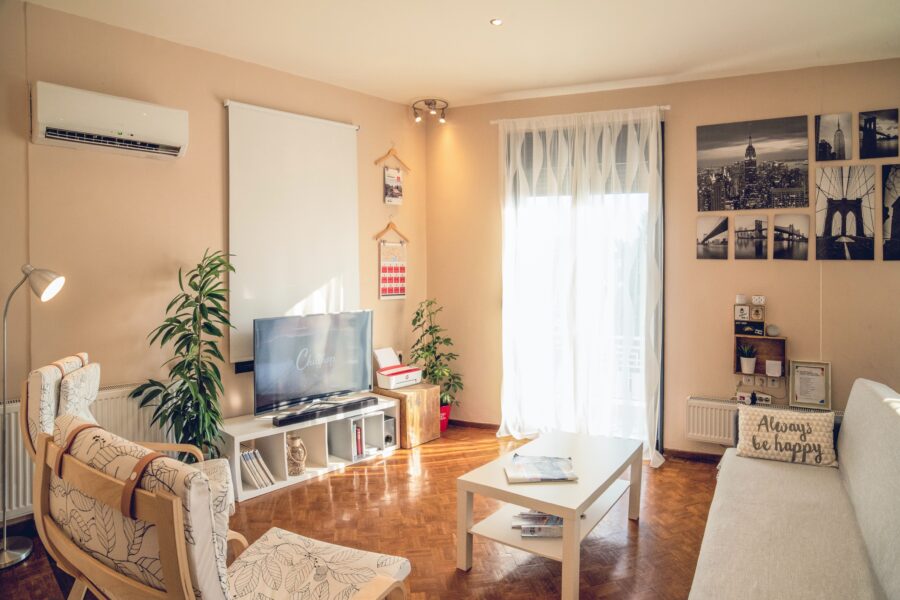
Looking for an apartment can be a stressful process, especially if it’s your first time finding a place of your own. People will have lots of questions, and you may be overwhelmed looking for answers.
What is your rental budget? How many applications can you afford? How does your credit score look to realtors? All of this can be overwhelming, but setting the time aside to map out your finances can help eliminate some of the stress.
Here’s how you can get started.
3 things you need to know when budgeting for an apartment
If you want to budget for your apartment, there are three things you need to plan ahead for. These are your up-front costs, basic lease responsibilities, and hidden fees.
1. You need the know all of the up-front costs
Apartments come with a lot of budget considerations from the very start, so make sure you have money set aside for any up-front costs. Up-front costs include application fees, move-in fees, and security deposits.
An application fee is money you’re not getting back, and running an application can ding your credit score a bit. As you know, your credit score is very important to landlords in the application process and for other big purchases. That’s why it’s important to only apply for apartments you are seriously considering, preferably after seeing them in person. Before applying, make sure the apartment meets all your criteria, like having the right amenities and being located in a neighborhood you are happy to live in.
The owner or realtor will likely ask that you pay a security deposit or move-in fee when you are signing your lease. Security deposits are typically one month’s rent, but depending on the state you live in, there may not be a legal limit to what they can ask for. You may get your security deposit back at the end of the lease, provided there’s no damage, back rent, or clauses that your landlord has written into your lease. (Be on the lookout for these stipulations!)
There’s also the cost of moving into the apartment. If you’re planning on using movers, have the money set aside based on their quote. If you have some friends helping you, rent the truck well beforehand and set aside some money for a nice lunch or a few gift cards to say thank you.
2. You need to know the basic responsibilities of the lease
When you’re signing your lease, make sure to read it front and back. You don’t want to make any promises you can’t keep.
First, look for clear terms and conditions regarding your rent. Know how much you’ll need to pay each month and when. Usually, there’s a timeframe for when rent is considered late. You should strive to pay rent on time to maintain a good relationship with your landlord, but it’s good to know when a late fee will be applied just in case something happens.
Rent is a primary payment you’ll need to make consistently, so it should be an amount you’re okay with losing at the start or end of each month. A common rule is rent should make up less than 30% of your monthly income. If that’s not possible for you, you may want to consider splitting the costs with a roommate or renting out extra space if that’s allowed in the lease.
You should only sign a lease after understanding which utilities you’re responsible for. Depending on where you live and who your landlord is, they may include utilities as a part of your rent. In most cases though, you will be responsible for setting up and covering the cost of at least some utilities. You can always ask your landlord how much other tenants pay on average for utilities so you can plan ahead.
It’s okay to clarify anything that’s unclear with your landlord!
You may not understand a portion of the lease, but they may have also forgotten to include it. If any revisions need to be made, your landlord will want to make them to avoid liability issues.
Remember, you have rights as a tenant to argue portions of the lease!
3. You need to know any hidden fees you’ll need to pay
Now that you’ve considered all the basic costs of your apartment, it’s time to look for any extra costs associated with the lease. These fees aren’t as apparent as the others, but many landlords will ask you to make them depending on your situation.
If you have a pet, does the landlord have a pet policy with an associated fee? Many laws claim that the pet deposit should be “reasonable,” but these fees may apply to each pet you have.
If you have a car, does the building have a parking space for you? If so, is it a one-time fee or something you’ll need to pay every month? If not, is there free street parking or will you need to pay for a parking permit?
Many landlords require renters insurance as well. You can add this through your existing insurance provider or purchase it from another company. It’s usually not that expensive, but it is a recurring expense you’ll want to factor in.
Lastly, you may have additional cleaning or maintenance costs. Some maintenance is usually provided by the landlord unless you were at fault for the damage. It’s typically their responsibility to upkeep appliances, but there may be a monthly maintenance fee that’s tagged on to rent. This also means setting aside money for cleaning at the end of your lease (this helps you get your security deposit back in full).
3 tips to save for your new apartment
1. Save for the worst-case scenario
If you’re planning on saving for your new apartment, it’s great to start building up your emergency fund. An emergency fund is a cash reserve you have to pay for unexpected expenses or emergencies. You never know what life will dish out, and you don’t want to be set back by a minor expense you weren’t expecting.
You may have an emergency fund for car repairs, medical expenses, or maintenance. But you may need it for rent as well. If you lose your source of income or you have an emergency that takes you away from work, you don’t want to be hung out to dry when rent comes around. It’s good to have at least one month of rent saved to prepare for this.
You can build this up over time, making small deposits to your savings after each paycheck. An emergency fund keeps you financially resilient even in unforeseen circumstances.
2. Incorporate other costs into your budgeting
When you’re budgeting for your apartment, rent and bills aren’t the only things you need to consider. Sure, you may have enough for rent each month, but you also have to eat and get around. Plan your apartment budget based on other costs, too, like insurance, transportation, and groceries.
Budgeting for variable expenses like groceries can be tricky, but take the average amount that you spend on food each month. Then, compare your food costs and settle on a number that seems reasonable.
These expenses have added trade-offs, too. If you have a car, where you live impacts how expensive gas is. If you have a longer commute from your new place, this can also increase the money you need for transportation.
Also, certain neighborhoods are more expensive than others, especially when it comes to restaurants and leisure activities. Consider how costly your new neighborhood is in your budget.
3. Avoid large credit payments whenever possible
Moving to a new place can incur a ton of large expenses, including moving costs and new furniture. It’s easy to say, “Oh, I’ll just put it on my credit card and pay it later.” It’s definitely nice to have a credit card in this situation, but try not to rely on it too much.
Avoid making these payments on a credit card when possible. These payments can rack up, and the interest you’ll pay can pile up quickly if you’re not careful. It can be difficult to pay off interest at the same rate, especially when you have so much to pay for in your new apartment.
You may be tempted to put your rent payment on your credit card if you don’t have enough in your checking account. However, try your best not to do this. This is a huge payment that’ll put a strain on your credit limit. Also, many landlords don’t allow this in the first place, but if they do, they often have fees associated with credit payments. If you need help with rent, there are plenty of rental assistance programs out there.
If you need new furniture for your place, go thrifting instead to save money. There’s tons of furniture in good condition at a good price in thrift stores. Hey, you may even find a nice antique!
Also, you can try to DIY some decor for your apartment! You may even take the chance to reduce your clutter.
SaverLife can help you put away toward your apartment saving
Congratulations on your new place! Hopefully, now that your numbers are settled, you can make your apartment your home. Budgeting for your apartment is a great step toward financial stability in the first few months, but it’s important to stick to it to remain financially resilient!
Need some help saving up for some of those extra costs? Why not try SaverLife? While you’re saving up your emergency fund, SaverLife will give you points you can put towards extra cash or rewards.
You can even put that cash towards some new furniture! Also, you can participate in a savings challenge with your move on the horizon or ask our community for budgeting tips. Interested in getting started? Sign up today!

